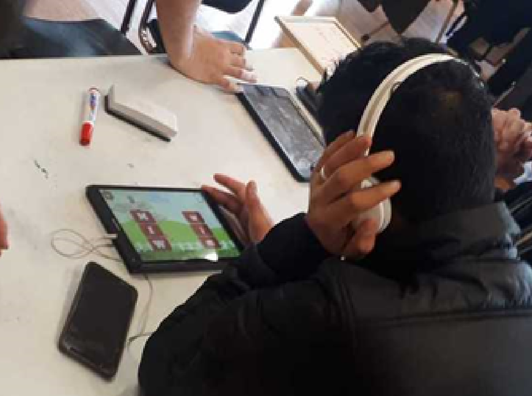Tabliteracy Learning
Tabliteracy* uses android tablets and phone tech to help migrants become active digital citizens. This course helps marginalised migrants in the northeast inner city to develop their digital skills for greater access to information vital for living in Ireland, and will promote their digital skills in order to help them participate more in their communities as active citizens. At the same time, participants with lower levels of English will expand their knowledge of the English language using a specially devised curriculum which will be delivered using tablet technology. The Tabliteracy[course was designed by our specialist in the area of migrant linguistics Dr Sheekey and is proposed to run for 12 weeks from early 2022. *Sheekey 2019
Digital Divide
With many public, private and community organisations moving much of their services and information online, digital literacy is becoming essential for most citizens to navigate these changes and participate more fully in this digital society. The reality of a ‘Digital Divide’, where some cohorts have less access to this digital society, is even more stark for migrants who already struggle with language and localised knowledge. A recent report by the National Economic & Social Development Office[1] outlines for example that ‘those with literacy difficulties, and those who are non-native-English speakers, find it hard to navigate online public services’.
[1] Digital Inclusion in Ireland: Connectivity, Devices & Skills, NESDO 2021
This reality is also recognised by the European Commision which identifies the challenges and goals around this issue:
"Migration flows pose new demands and challenges in the educational field. With the proliferation of social networks and continuous changes in technology, education and work-related training requires paying attention to ICT skills among migrant populations:
'Migration flows pose new demands and challenges in the educational field. With the proliferation of social networks and continuous changes in technology, education and work-related training requires paying attention to ICT skills among migrant populations." (source -EU Website on Integration)
Tabliteracy curriculum
Since the technology and applications used on tablets are similar in many ways to those on the phones with which many of more cohort are familiar, the skills developed on this course can be easily transferred and practiced by participants in their daily lives on their own devices. We have witnessed first-hand the issues this project was created to deal with and have designed the course around real needs of this isolated group.
Depending on a digital and linguistic needs analysis of each group, the learning modules for this course can include:
- Device/application awareness
- effective web searching
- social and mainstream media
- connecting with heritage migrant groups locally
- Online learning
- Citizens rights and responsibilities
- Finding local services and people
- Emails and digital communication
- Citizens’ advice and advocacy groups
- Locating public offices and agencies (health, housing welfare, etc.)
- Booking, buying and selling online
- Locating free or low-cost services (libraries, museums, courses)
- Job searching
- Pathways to mainstream/further education
- Online and device security and safety
- Sites of local/national culture
- Sites of local clubs/associations
Digicultural implications
Alongside the core competences this course is seeking to develop, due to the range of applications the technolgy offers, there is great scope to explore exciting intra/intercommunity follow-ons such as e-twinning, self-mapping, street literacy, mobile film making, co-blogging, etc. There is also room to expand activities such as our intercultural storytelling into online spaces in diverse social and geographic settings.
Useful Links
A nuanced approach to digital literacy and skills
The Digital Literacy Curriculum Resource
Digital Skills Passport
Supporting adult educators in becoming ambassadors of digital transition
Digital Literacy Instructor’ (DigLin)
Tablets and multisensory learning
ISS Canadian Digital Resources - password
